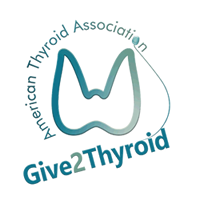ABBREVIATIONS & DEFINITIONS
 Autoimmune thyroid disease: a group of disorders that are caused by antibodies that get confused and attack the thyroid. These antibodies can either turn on the thyroid (Graves’ disease, hyperthyroidism) or turn it off (Hashimoto’s thyroiditis, hypothyroidism). This characterized by positive TPO antibodies.
Autoimmune thyroid disease: a group of disorders that are caused by antibodies that get confused and attack the thyroid. These antibodies can either turn on the thyroid (Graves’ disease, hyperthyroidism) or turn it off (Hashimoto’s thyroiditis, hypothyroidism). This characterized by positive TPO antibodies.
Hypothyroidism: a condition where the thyroid gland is underactive and doesn’t produce enough thyroid hormone. Treatment requires taking thyroid hormone pills.
Overt Hypothyroidism: clear hypothyroidism an increased TSH and a decreased T4 level. All patients with overt hypothyroidism are usually treated with thyroid hormone pills.
Subclinical Hypothyroidism: a mild form of hypothyroidism where the only abnormal hormone level is an increased TSH. There is controversy as to whether this should be treated or not.
TPO antibodies: these are antibodies that attack the thyroid instead of bacteria and viruses, they are a marker for autoimmune thyroid disease, which is the main underlying cause for hypothyroidism and hyperthyroidism in the United States.
TSH: thyroid stimulating hormone — produced by the pituitary gland that regulates thyroid function; also the best screening test to determine if the thyroid is functioning normally.
Thyroxine (T4): the major hormone produced by the thyroid gland. T4 gets converted to the active hormone T3 in various tissues in the body.
Miscarriage: this occurs when a baby dies in the first few months of a pregnancy, usually before 22 weeks of pregnancy.
In-vitro fertilization: a procedure when an egg is fertilized outside of the body and then implanted in a woman to achieve a pregnancy
Meta-analysis: a statistical analysis of several separate but similar experiments or studies in order to test the pooled data for statistical significance




